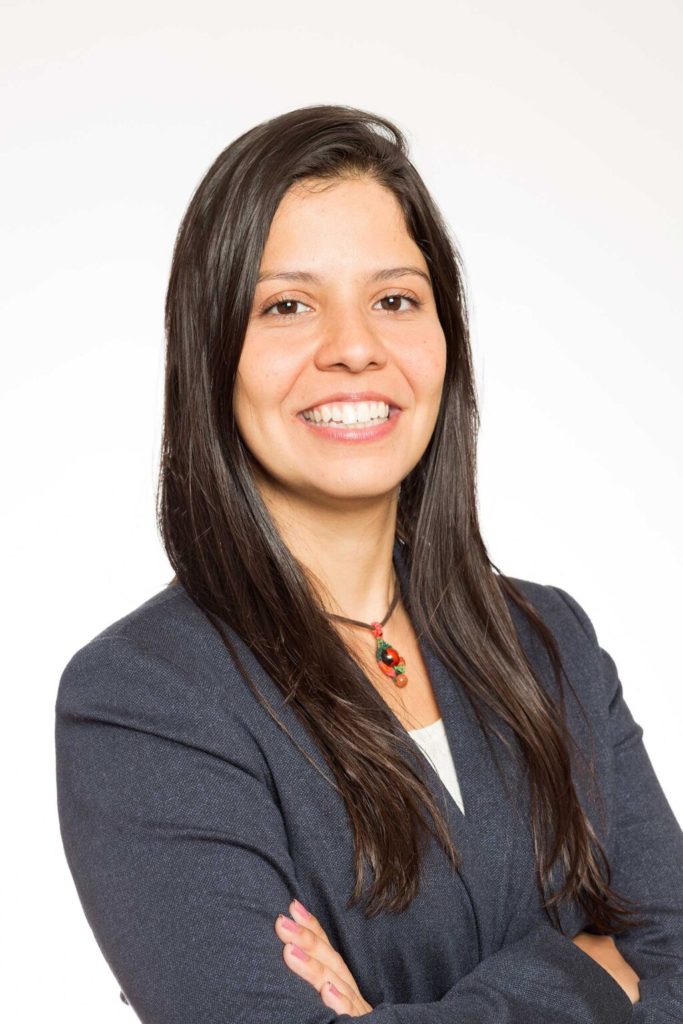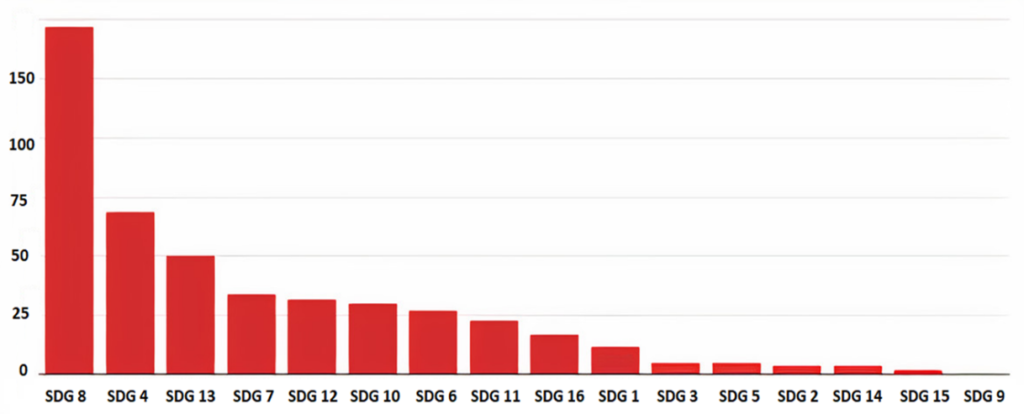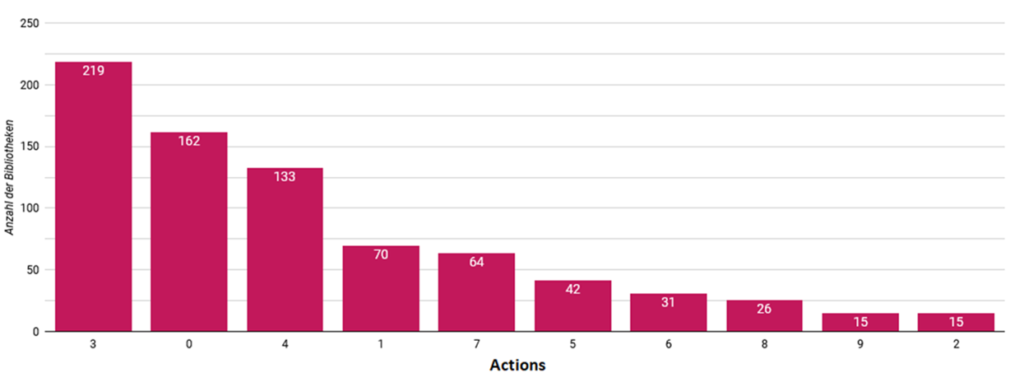Helping every library work with the SDGs: Interview with Nathalice Cardoso
17 January 2022
The United Nations 2030 Agenda is not just a document for governments, rather it sets out responsibilities for everyone, including libraries! However, it is not always easy to make the connection between high-level policy documents and day-to-day library operations.
Nathalice Cardoso, a Brazilian Librarian and researcher with experience in Brazil and Germany in particular, has been exploring the engagement of libraries with the SDGs, and developing tools to help others explore. We interviewed her to find out about her work and findings.

IFLA: How did you first get interested in the contribution that libraries can make to achieving the SDGs?
Nathalice Cardoso (NC): My interest first began with environmental issues because I really like nature. When I started my undergraduate course in Library Science in Brazil, I noticed that many of my classmates did not care much for the theme. So, I decided to research the subject and I noticed that there were very few publications relating Library Science and the environment. It was then that I decided to write my thesis on the contribution that librarians can make to environmental education.
Since then, my interest in the theme has grown. At that time, I was an intern in a library specialized in biodiversity and I felt that I really wanted to go deeper into the theme as I did not know some of its subjects, such as REDD (Reducing Emissions from Deforestation and Forest Degradation). In that context, I decided to specialize in Environmental Management and, in that course, I learned a lot about sustainable development and the terrible impacts that people have caused on nature throughout the years, with direct consequences on our lives, our health and the future of the planet.
For this reason I decided to bring that knowledge to Library Science aiming to raise awareness among librarians regarding environmental issues and sustainable development, because I believe that libraries are institutions capable of transforming people and can help to solve local problems.
Soon after that, I felt that I should move on to a Master’s course – this time focusing on green and sustainable libraries. In 2015, the year I defended my Master’s thesis, the United Nations launched the 2030 Agenda (previously called 2021 Agenda), and with it, the Sustainable Development Goals (SDGs). I then had the idea to expand the scope of my research and address not only the environment, but also social and economic issues, showing how libraries can contribute to reach the SDGs.
IFLA: What makes the SDGs special as a framework for libraries?
NC: Actually, libraries have always worked to contribute to achieving some of the SDGs. We can cite, for example, SDG 4 (Quality Education) or SDG 10 (Reduced Inequality), considering that public libraries are meant for everyone. At the same time, unfortunately, many libraries still lack projects and services aimed to eradicate prejudice, fascism, homophobia, etc.
My fight is to make librarians understand that it is possible to work with all the SDGs and also to show the importance of creating new projects to attract people who really need and depend on these facilities to have a better life.
IFLA: On your website, you mention that 53% of library and information workers in Germany are aware of the SDGs, but 47% are not. What do you think prevents people from being aware?
NC: I believe that three factors are responsible for low levels of awareness regarding the SDGs. The first one is the lack of continuing education. Another factor is that many colleges do not include the theme in their undergraduate Library Science courses. And a third point is the lack of communication.
But why am I saying that? We know that many institutions do not have sufficient financial resources for their staff’s continuing training or to pay for the costs of participations in events or congresses. Quite often, only one employee is chosen to attend, and that is usually the head of the library. And, unfortunately, there are still people who attend important events and courses but do not share the knowledge with the other members of the institution – the knowledge is not passed on to others and remains stagnant.
One thing that makes me happy is that IFLA, as well as the librarians’ associations of several countries, have been working to spread and publicize the SDGs, which has led to growing interest among librarians, in research and in the practical field. I have received requests, from Brazil and from other countries, to discuss the theme and I believe that soon more librarians will become aware of the importance of this theme. It is just a matter of time.
IFLA: What sense did you get of how common it is for libraries to act on the SDGs?
NC: The problem is that there are many people today who still believe that sustainable development is only related to environmental issues and forget the social and economic issues. When you ask librarians about the contribution libraries can make to the SDGs, their first reaction is to think that they have nothing to contribute because many libraries do not have any service or project focused on environmental sustainability. However, when you bring practical examples that can be implemented in the everyday services provided by libraries, considering social and economic issues, they notice that a lot has been done.
IFLA: What do you think makes the difference between simply being aware of the SDGs, and taking action on them?
ND: Knowing is already a good starting point, but knowledge that is not shared or put into practice, in my opinion, is useless. I really believe that local actions can solve local problems. That is why I think that it is very important for librarians to transform knowledge into action, because, without any doubt, libraries change and save lives. It is a crucial and pressing issue for us to recover the social responsibility of library science, including for environmental and economic issues, because these factors are directly related.
IFLA: In which areas do you see most engagement in the SDGs?
NC: My research was done in Germany, so what I can say is that it was interesting to notice that, unlike my previous expectations, libraries in Germany are working more on SDG 8 (Decent Work and Economic Growth), as you can see in the graph below:
Which SDGs are German libraries addressing?

However, although more attention has been given to SDG 8, we can notice that, according to the actions (in the second image), many libraries are not performing any activities related to SDG 8 yet, which means that there is still much room for improvement.
SDG 4 (Quality Education), which is usually the most associated to libraries, occupies the second position. Maybe this is related to the factor that the German school system has an excellent reputation: according to an OECD/PISA study (2018), German students scored higher than the OECD average in reading, mathematics and science. It is worth remembering that many actions related to SDGs 8 are also related to SDGs 4, so the two complement each other. The survey also suggests that SDG 9 (Infrastructure, Innovation and Industry) is not being worked on at all.
SDG 8 – Decent Work and Economic Growth


IFLA: What have the most interesting areas or forms of engagement been for you?
NC: That question is difficult to answer because there are many good initiatives, but I can cite a few that have filled me with hope and pride of libraries.
A great example is the project of the Hamburg Central Library (Bücherhallen Hamburg) called “Dialog in Deutsch” which means “Dialogue in German.” This is a project aimed at immigrants living in Germany who are learning German. There is a room in the library where they can talk in German with other participants with the help of a volunteer who mediates the conversations. Even during the COVID-19 pandemic, the project did not stop and became online meetings. The most interesting point is that the project began as an initiative of the library itself and was first funded through fundraising. Its success was so big that the state recognized the importance of the project and stared to finance it.
Another amazing project is that of the “Stadtbibliothek Bad Oldesloe” library, which won the 2017 IFLA Green Library award. This project, called “Harvest Your City,” combines urban gardening with makerspaces and community-building efforts, demonstrating that libraries are more than just book-lending stations. The project celebrates public libraries as meeting places for collective thinking about ecology, space and creativity – civic engagement that is inviting and accessible. This project was also created as a stand-alone initivative of the library, but after a few years, the event grew so much that it became a city event – an initiative that began with the library became an event of the city itself. This is a wonderful example of how libraries are powerful institutions and that they can even create a project for the city as well.
Another interesting project is that of a library called “Stadtbibliothek Wetzlar,” which organized a week-long event named “Europäische Nachhaltigkeitswoche” (European Week of Sustainability) with several activities, including the Repair Café, where people went to the library to learn how to fix broken things.
These are just some examples that show how libraries have the power to create and develop the projects they want – all they need is readiness, librarians‘ creativity, and partnerships with other institutions, which are crucial to improve the services provided by libraries. I am very happy to see that a growing number of librarians have become interested in learning about the Sustainable Development Goals and taken action.
IFLA: What are, for you, the next steps?
NC: The next step, in my opinion, is to encourage all librarians to rethink the job’s social role; unfortunately we can’t wait for solutions from politicians or governing bodies to achieve a better world. Depending on the country and the political situation, then we really shouldn’t expect anything at all. We need to be militant! Our libraries, in addition to being powerful, are also crucial spaces, not only for research and reading, but also for learning in general, where people can exchange ideas and take part in events – through this exchange, ignorance and prejudice can be overcome.
Working only for the facility’s regular users is important, but what is really important is for the library to reach those who need its services the most and depend on it to have a better life. Quite often those people never go into a library and do not know what it has to offer. Other times, they cannot get to a library without help because they have health issues or are physically disabled. Even a lack of language fluency may impair this connection.
I have also noticed that a poor marketing service from the libraries’ quarters is still a problem. If we can’t disclose our services efficiently, it will be quite hard to reach those who really need them. The lack of financial resources is also a complicated factor that hurts a lot of libraries; but if we do not show society the importance of library services, it will be even more difficult to obtain more resources and partners.
If this is happening to your library, you should seek help from other institutions and start new partnerships to develop projects. There are many private companies, as well as public servants, that are available to help because they believe in the potential of libraries and know their importance.
Taking all of this into account, I decided to create a calculator for libraries. The calculator can measure the best way a library is contributing to the SDGs and what can be improved. Fortunately the calculator is already available in nine languages on the website www.libraryscience.de and in the future it will also be available in Arabic.
In the case of libraries that have no knowledge on the subject, there is also a checklist with examples of activities that can be implemented in any library. I would like to stress that the examples shown are only a basis, but each librarian can adapt them according to his country‘s reality and the community he is serving. After all, each region has its specific characteristics – and each library, too.
All things considered, I hope you enjoy and make use of this new tool and I would like to say that this work is just the beginning and that you, librarians and future librarians, are responsible for continuing this work, by adapting the checklist to your reality so that we can contribute to a better world. United we are stronger!
Data and tables submitted by Nathalice Cardoso (2021). Taken from the research “German Libraries and Agenda 2030: Challenges to Achieve the Sustainable Development Goals (SDGs)”: https://libraryscience.de/publication/